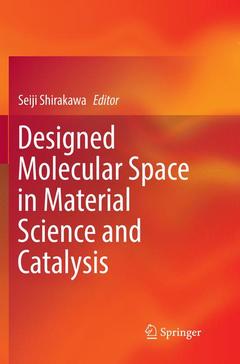Description
Designed Molecular Space in Material Science and Catalysis, 1st ed. 2018
Coordinator: Shirakawa Seiji
Language: English
Subject for Designed Molecular Space in Material Science and Catalysis:
Designed Molecular Space in Material Science and Catalysis
Publication date: 01-2019
262 p. · 15.5x23.5 cm · Paperback
Publication date: 01-2019
262 p. · 15.5x23.5 cm · Paperback
Designed Molecular Space in Material Science and Catalysis
Publication date: 10-2018
Support: Print on demand
Publication date: 10-2018
Support: Print on demand
Description
/li>Contents
/li>Biography
/li>Comment
/li>
This book focuses on molecular space chemistry, which is recognized as an important concept for the design of novel functional materials and catalysts. A wide variety of topics and ideas included in this book are based on that concept. The book showcases recent representative examples of molecular space design to create functional materials and catalysts possessing unique properties. This unique volume will be of great interest to chemists in a wide variety of research fields, including organic, inorganic, biological, polymer, and supramolecular chemistry. Readers will obtain new ideas and directions to create novel functional molecules, and those ideas will lead to innovative views of science.
π-Electronic Ion-Pairing Supramolecular Assemblies.- Molecular Space Chemistry Based on Pillar[n]arenes.- Inherently Chiral Calix[4]arenes as Supramolecular Catalysts.- Synthesis of the Longest Carbohelicene by Multiple Oxidative Photocyclizations of Arylene-Vinylene Oligomers.- Design of the Chiral Environment for Asymmetric Acid-Base Catalysis.- Biaryl Amino Acids and Their Surrogates: A Unique Class of Unnatural Amino Acid.- Interplay of Diamides and Rare Earth Metals: Specific Molecular Spaces and Catalytic Activity.- Control of Chiral Molecular Space Using Helical Polymers.- Functional Supramolecular Materials Formed by Non-covalent Bond.- Photo-responsive Dynamic Molecular Catalyst for Spatiotemporal Control of Chemical Reactions.- Mimicking Integrated Functions of “Molecular Space” in Biological Systems by Using Crystalline Cavities Consisting of Short Peptides.
Seiji Shirakawa graduated from Nihon University (1997) and received his Ph.D. (2004) from Kyoto University under the supervision of Professor Keiji Maruoka. He worked with Professor James L. Leighton at Columbia University (2004–2005) and Professor Shū Kobayashi at University of Tokyo (2005–2007) as a postdoctoral fellow. He was appointed as an assistant professor at Nihon University in 2007, and moved to Kyoto University as an associate professor (2009). He is currently an associate professor in Nagasaki University since 2014. He has received The Commendation for Science and Technology by the Minister of Education, Culture, Sports, Science and Technology, The Young Scientists’ Prize (2013), Incentive Award in Synthetic Organic Chemistry, Japan (2014), and Nagase Foundation Award (2015). His research interests include supramolecular catalysis and onium salt catalysis.
Focuses on molecular space as a key concept Includes a wide variety of topics based on molecular space chemistry Is written by rising stars in the field of molecular space chemistry
© 2024 LAVOISIER S.A.S.




